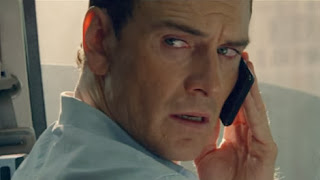As soon as The Counsellor
opened in London, a Spanish friend and I sprinted over to the Fulham cinema. My
friend has fellow Spaniard Penélope Cruz’s interests at heart. And I’m from
Munster, so naturally I cheer for Michael Fassbender. He plays the leading role,
the nameless counsellor who is overwhelmed by his love for his girlfriend (Cruz)
and asks her hand with a costly engagement ring. The counsellor will pay
for it with a one-time drug deal.
Fassbender’s counsellor has a rich variety of personal traits.
He’s a man-in-love, his eyes liquefy when he beholds his fiancée, and he has an
enraptured tone of voice when he whispers poetic sweet-nothings to her (‘you
are a glory…you are a glorious woman’).
In interviews, Fassbender has been quick to identify
that the counsellor’s chief mistake is that he thinks himself cleverer than he
is. He’s a conceited man who may be book-smart, but has little savvy and has
the job of giving advice but paradoxically goes advice to avoid drug
lords. He is also ‘a smart-ass’, which is the term of disaffection used for him
by Ruth, a prisoner client of his.
It’s the scene where he visits Ruth in a gaol cell that
Fassbender proves his acting acumen. Fassbender has taken off the smiling mask
that the counsellor uses for his fiancée, and we see a very self-satisfied
individual, who thinks he’s too good for the imprisoned mother. Every tiny
detail of Fassbender’s performance creates a portrait of hubris.
In the way he throws down the box of cigarettes that he’s
brought for her, the wolfish grin, the glinting eyes and the way that he won’t
sit opposite her but stands over her. The mother entreats him to help her son,
who has just been gaoled and needs $400 bail. With an even bigger smirk, he
agrees to do it, doing so proves his higher station. He can help her son, she
cannot. In return, the mother offers him a sexual favour, to which he replies sniggeringly
that even if she gave it to him; she would still over him $380.
Fassbender smoothly delivers those sickly
smirks or the laughing tones of contempt in which he speaks to Ruth. He
suffuses his voice with a barely-restrained laugh. Ruth is a figure of fun to him.
You might want to strangle Fassbender’s counsellor, but he leaves the same bad
taste in the mouth that these ‘smart-ass’ types do in real life.
Ruth’s son is a drug runner for the Mexican
cartel with whom he is doing a deal. While motorcycling across America with a
drugs parcel, the son is beheaded, his parcel stolen, and the cartel are
convinced that since the counsellor sprung the drug-runner from gaol, that he
is behind the whole counter operation.
They think the condign punishment for the counsellor is
that his loved one be slaughtered. Ironically, the counsellor and Ruth will
both be reduced to the same level, they will both be torn by loss and grief.
She has lost her son, he his beloved.
The film’s failing is that we never *understand* why
the counsellor is so profoundly in love with his intended. Sure, she is
sweet-tempered and beautiful. And over this past weekend, two male friends have
at pains to stress how ‘hot’ she looked lying on the towel in the spa. But,
ultimately our knowledge of her is skin deep. We never see the layers of her
character, her good deeds (or lack of them), would she be a friend in a time of
need.
In simple terms, we never get to know her. We see the counsellor mourn a
beautiful woman who has been butchered, but we don’t grieve with him because our rapport with her is
the same as with a fashion model that we admire on the cover of a magazine.
We may not understand why he loves her, but we believe he loves her. Why else would he grieve her so intensely? But we are dependent on Fassbender’s depiction of
grief ripping through his body, causing his face to fracture in agony, for the
film to make sense.
The film has more sparkle than substance. Yet it
achieves its central objective: to be a morality tale about the hazard of
hubris, and the mighty counsellor falls from a height of his own making. It’s
Fassbender’s depiction of two opposing states of existence that make the film
work; the glutted-with-hubris ‘smart-ass’ who risks everything for easy money,
and then the grief-ridden and guilt-frenzied shaking wreck that
he becomes.
The
key to his success: Fassbender succeeds in authenticating these flawed characters,
because he enters fully into the persona, body-language, tone of voice, without
letting cares about how the real-life Michael Fassbender might be judged when
cinema go-ers watch him act.
Interviewers and journalists always ask Fassbender if he is similar in any way to the characters that he plays. It always strikes me a rather silly line of questioning. The only way for him to go into role as these complicated personalities is to put his instinctive reactions to one side, and submerge himself in the character's mind and adopt their reflexes.
Interviewers and journalists always ask Fassbender if he is similar in any way to the characters that he plays. It always strikes me a rather silly line of questioning. The only way for him to go into role as these complicated personalities is to put his instinctive reactions to one side, and submerge himself in the character's mind and adopt their reflexes.
Aspects of how Fassbender prepares for a role are
common knowledge, such as the way he may read a script 300 times. But were I to
interview Fassbender, top of the list would be how he practises every detail of
body language and tone of voice so as to ‘become’ a character.




No comments:
Post a Comment